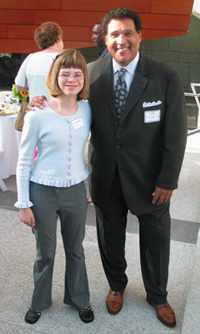 |
Greg Gumbel, Emmy Award winning sportscaster and a national March of Dimes trustee, was in Omaha Wednesday. |
“Obesity among women of childbearing age is at a crisis level,” said Jennifer Howse, Ph.D., president of the March of Dimes. “We are concerned because it means more women are overweight or obese when they become pregnant, and this can have serious consequences for both mother and baby.’
Obesity among Nebraska women of childbearing age continues to rise. Obesity rates for females aged 20-29 years nearly tripled from 1992-1994 to 2001-2002, increasing from 5 percent to 13.8 percent. In an average week in Nebraska 11 percent of babies are born premature, according to the March of Dimes.
 |
UNMC Chancellor Harold M. Maurer, M.D., meets with Greg Gumbel and Dennis O’Neal, First National Bank President-Corporate Bank during a March of Dimes breakfast in downtown Omaha. |
Siobhan (SHOW-VON) Dolan, M.D., assistant medical director of the March of Dimes, who is with the team spearheading the organization’s National Prematurity Campaign, agrees. “”Weight does matter,” she said. “Weight is an important medical predictor of pregnancy outcome. We can all play a role in letting women know how to figure out their body mass index.”
To address the issue in Nebraska, the March of Dimes is making a collection of educational materials available to pregnant women and those women considering becoming pregnant at no charge. Over the next week packets of information will be available through 17 Omaha sites. The materials will emphasize the need for prenatal care as a step to control obesity and other preterm birth risk factors.
The announcement came Wednesday during a breakfast co-sponsored by the March of Dimes partners’ First National Bank of Omaha and UNMC. Greg Gumbel, Emmy Award winning sportscaster and a national March of Dimes trustee, was the featured speaker at the event.
 |
National sportscaster Greg Gumbel joins Sarah Weidner at a March of Dimes breakfast in downtown Omaha. |
On Nov. 16, March of Dimes will continue to address the various factors surrounding preterm birth through grassroots prematurity summits to be held in Omaha and Lincoln. The general public, health care centers and various community leaders will be invited to attend the summits.
“The incidence of premature births in Nebraska has been slightly but steadily increasing over the last 10 years,” Dr. Smith said. “It is incumbent upon institutions that perform and fund research to try and identify causes of premature delivery.”
|
|
The March of Dimes is a national voluntary health agency whose mission is to improve the health of babies by preventing birth defects and infant mortality. Founded in 1938, the March of Dimes funds programs of research, community services, education, and advocacy to save babies and in 2003 launched a five-year campaign to address the increasing rate of premature birth.
For more information, visit the March of Dimes Spanish Web site or its English Web site.